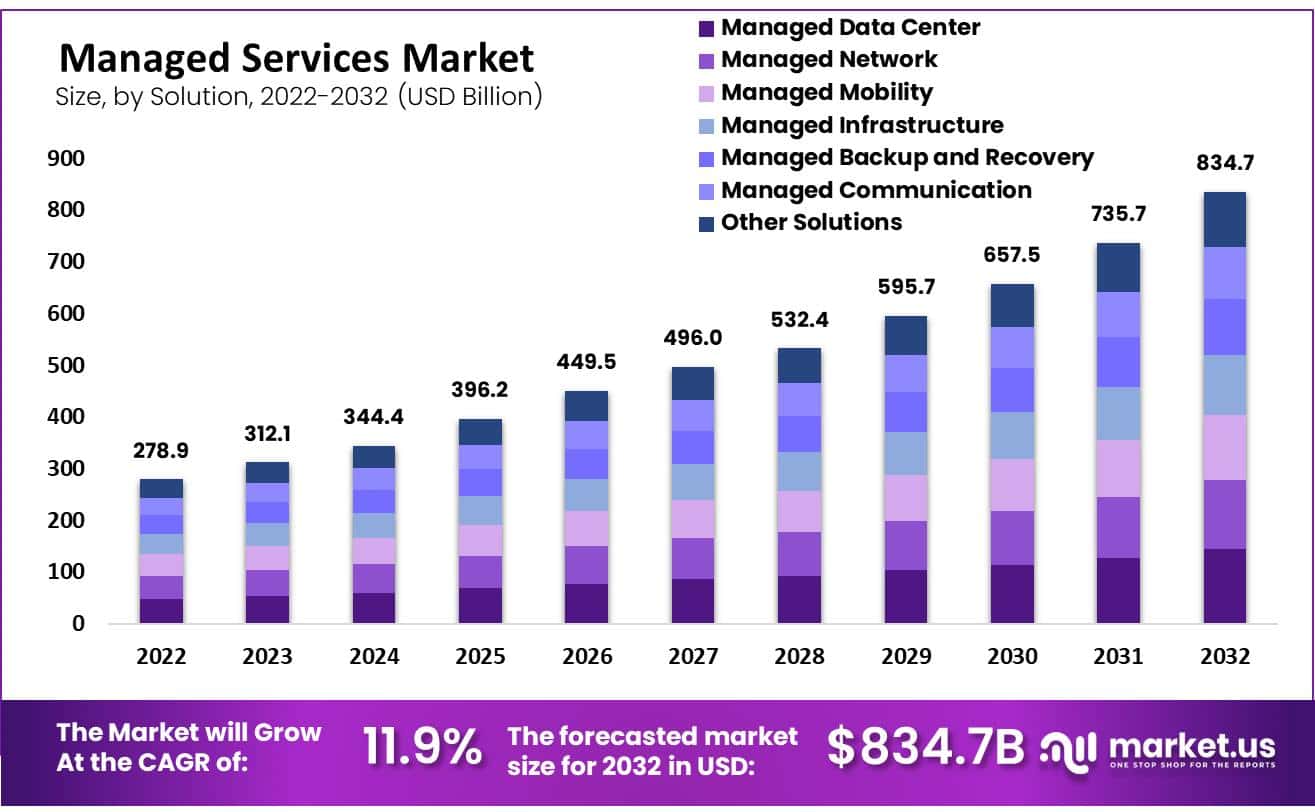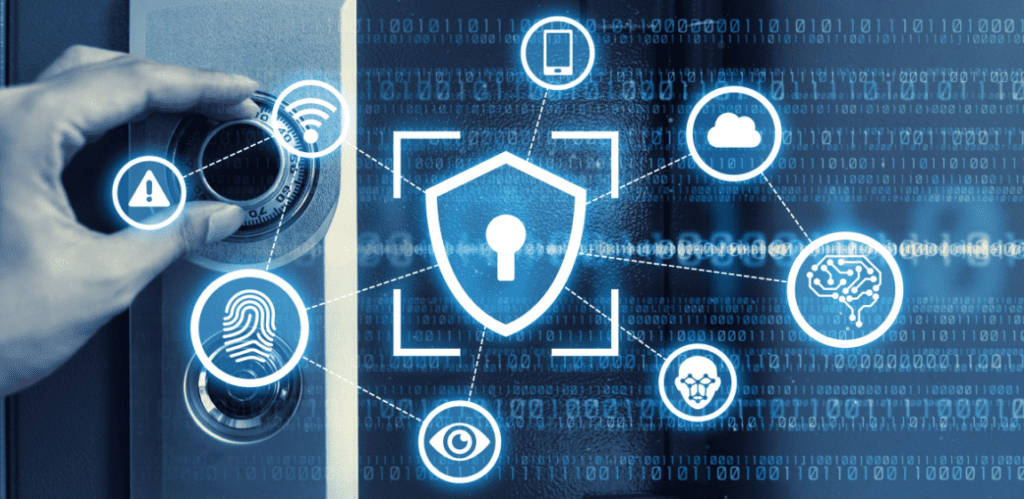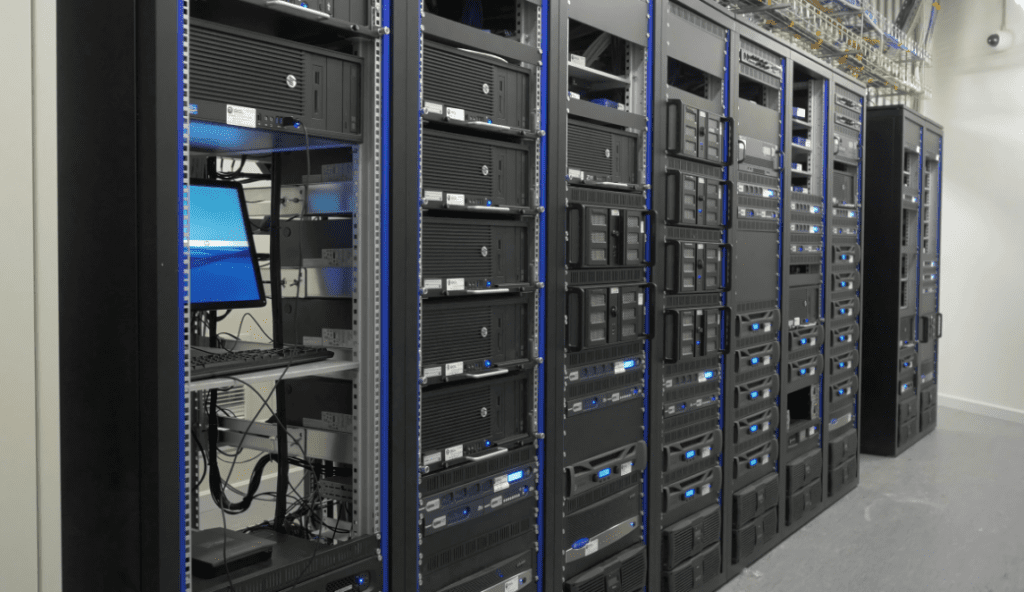
Tim Mektrakarn - CISSP | CISA | ISO 27001
May 5, 2025
MSP Compliance Solutions
Managed Service Providers (MSPs) manage and safeguard critical IT infrastructure and data. For MSPs, compliance is not just a regulatory mandate but a cornerstone of trust and credibility. Ensuring adherence to industry standards and regulations is paramount for MSPs, as it mitigates risks associated with data breaches and cyber threats and reinforces their commitment to delivering secure and reliable services. For MSPs, compliance is more than just ticking boxes; it’s about upholding a reputation, fostering client confidence, and ensuring sustainable business growth in an increasingly interconnected world.
According to a market analysis report by market.us, the global managed services market is expected to be worth over $834B by 2032 with a CAGR of 11.9% from 2022 to 2032. The growth is fueled by several factors including:
- Increasing complexity of IT systems and the need to outsource expertise to domain experts
- Cost savings and economies of scale to a broad but also specialized knowledge is getting expensive.
- Scalability and the need to adapt IT infrastructure to changing business needs.
- Access to new technologies and resources to deploy the most recent technologies.
- Focus on the core business and leave IT to the experts.
With the growing number of Managed Service Providers handling large amounts of customer data, the need to ensure security and integrity of customer’s data is even more evident.
What is MSP Compliance?
MSP compliance refers to the adherence of Managed Service Providers (MSPs) to a set of established regulations, standards, and best practices specific to their industry. This compliance ensures that MSPs operate within the legal and regulatory frameworks pertinent to their services, especially when handling sensitive data or managing critical IT infrastructure. Compliance encompasses a broad spectrum of areas, including data protection, cybersecurity, service delivery, and operational integrity. It is not just about meeting legal requirements but also about aligning with industry benchmarks and best practices to deliver consistent and high-quality services.
The importance of compliance for MSPs cannot be overstated. Firstly, in an era where data breaches and cyber threats are rampant, compliance plays a pivotal role in protecting client data. Clients entrust MSPs with their most sensitive information, from financial records to personal customer data. Ensuring that this data is handled with the utmost security and in accordance with regulatory standards is paramount to maintaining trust and preventing costly breaches.
Secondly, compliance is a testament to the quality of service an MSP provides. Adhering to industry standards and regulations means that the MSP is committed to delivering services that meet certain benchmarks of excellence. This not only instills confidence in existing clients but also makes the MSP more attractive to potential clients seeking reliable and professional service providers.
Lastly, maintaining compliance ensures that MSPs are up-to-date with the ever-evolving industry standards. The IT landscape is dynamic, with new challenges and technologies emerging regularly. By staying compliant, MSPs position themselves at the forefront of the industry, ready to adapt to changes and offer the most current and effective solutions to their clients. In essence, compliance is a continuous journey of improvement, adaptation, and commitment to excellence for MSPs.

The Growing Need for Compliance in the MSP Industry
The MSP industry is witnessing an unprecedented emphasis on compliance, driven largely by the escalating landscape of cyber threats. As cybercriminals employ more sophisticated tactics, businesses of all sizes find themselves vulnerable to breaches, ransomware attacks, and data theft. Given their role in managing IT infrastructure and data, MSPs are not only targets themselves but also gatekeepers for many organizations’ cybersecurity defenses. Their position places them at the forefront of this digital battleground, necessitating robust compliance measures to counteract these threats. Additionally, regulatory bodies are recognizing the pivotal role of MSPs and are introducing more stringent requirements to ensure data protection and privacy. Clients, aware of these dynamics, are increasingly demanding their MSPs to be compliant with industry standards and regulations. They seek assurance that their chosen providers are equipped to handle the modern challenges of the digital age, making compliance a non-negotiable criterion in the MSP selection process.
MSPs have also been tasked with answering security questionnaires on behalf of their customers. Security questionnaires are comprehensive assessments designed to evaluate the cybersecurity posture, policies, and practices of an organization. When clients engage with third parties, be it for partnerships, collaborations, or vendor relationships, they are often required to provide insights into their IT environments and security measures. Given that MSPs manage and oversee these IT environments, they are best positioned to provide accurate and detailed responses to such inquiries. This increases the risks and liabilities MSPs are facing with rising Tech and Cyber Liability insurance.
Introduction to SOC 2 for MSP
The Service Organization Control 2, commonly known as SOC 2, is a framework for auditing and reporting on controls at service organizations, including Managed Service Providers (MSPs). Developed by the American Institute of Certified Public Accountants (AICPA), SOC 2 specifically addresses the security, availability, processing integrity, confidentiality, and privacy of customer data managed by these service organizations.
SOC2 for MSPs
SOC 2 is an auditing procedure that ensures service providers, like MSPs, securely manage data to protect the interests and privacy of their clients and the clients’ customers. Unlike its predecessor, SOC 1, which focuses on financial reporting, SOC 2 evaluates an organization’s non-financial reporting controls as they relate to security, availability, processing integrity, confidentiality, and privacy of a system. The SOC 2 report is based on the Trust Services Criteria (TSC), which provides a benchmark for the aforementioned five principles.
Why SOC 2 is Relevant for MSPs:
Why SOC 2 is Relevant for MSPs: For MSPs, achieving SOC 2 compliance is not just a badge of honor but a critical necessity in today’s digital landscape.
- Security: As custodians of client IT infrastructure and data, MSPs must demonstrate that they have robust security measures in place to protect against unauthorized access, data breaches, and other cyber threats. SOC 2 compliance provides third-party validation of these security measures.
- Availability: Clients rely on MSPs to ensure that their systems and applications are consistently available. SOC 2 evaluates the measures in place to ensure system uptime and resilience against disruptions.
- Processing Integrity: This ensures that the processing of client data is accurate, timely, and authorized. For MSPs, this means that any actions taken on client data, from backups to updates, are done correctly and with integrity.
- Confidentiality: Given the sensitive nature of the data MSPs handle, it’s imperative that they have controls in place to ensure data confidentiality. This includes measures against unauthorized access and data leaks.
- Privacy: Beyond just confidentiality, privacy ensures that personal information is collected, used, retained, and disposed of in accordance with an organization’s privacy notice and with criteria set forth in the SOC 2 framework.
In essence, SOC 2 compliance provides MSPs with a structured framework to showcase their commitment to best practices in these critical areas. It instills confidence in clients, differentiates the MSP in the market, and ensures that they are aligned with industry standards that prioritize the safety and integrity of customer data. Many MSPs focus their audit on Security, Availability and Confidentiality Trust Service Criteria.
Benefits of Achieving SOC 2 Compliance for MSPs
Achieving SOC 2 compliance is not just a regulatory milestone but a strategic move that offers manifold benefits to Managed Service Providers (MSPs). Here’s a closer look at the advantages that come with this compliance:
Enhanced Trust and Credibility with Clients:
- Building Confidence: In an era where data breaches and cyber threats are rampant, clients are more discerning about whom they entrust with their IT infrastructure and data. Having SOC 2 compliance signals to clients that the MSP takes data protection seriously and adheres to recognized industry standards.
- Transparency: The rigorous audit process involved in achieving SOC 2 compliance provides an in-depth view of the MSP’s operations, controls, and practices. Sharing this with clients fosters transparency and open communication.
- Reassurance: For clients, knowing that their MSP is SOC 2 compliant offers peace of mind, reassuring them that their sensitive data is in capable and secure hands.
Competitive Advantage in the MSP Market:
- Differentiation: In a crowded MSP market, having SOC 2 compliance can be a significant differentiator. It showcases the MSP’s commitment to excellence and can be a deciding factor for potential clients.
- Winning Larger Contracts: Many enterprises mandate SOC 2 compliance as a prerequisite for engagement. Being compliant opens doors to larger contracts and opportunities that might otherwise be inaccessible.
- Reduced Sales Friction: When pitching services to potential clients, having SOC 2 compliance can expedite the sales process, as it preempts many security and compliance-related queries.
Improved Internal Processes and Security Measures:
- Structured Framework: The process of achieving SOC 2 compliance provides MSPs with a structured framework to evaluate and enhance their internal controls, policies, and procedures.
- Proactive Approach: The regular audits and assessments associated with SOC 2 push MSPs to adopt a proactive approach to security, ensuring that they are always ahead of potential threats and vulnerabilities.
- Employee Training and Awareness: Achieving and maintaining compliance often involves training staff about best practices, raising overall awareness about security and data protection within the organization.
- Operational Efficiency: The rigorous standards of SOC 2 can lead to streamlined operations, reduced redundancies, and more efficient processes, ultimately benefiting both the MSP and its clients.
SOC 2 compliance is more than just a certificate on the wall. For MSPs, it’s a testament to their commitment to security, quality, and continuous improvement. The benefits of this compliance resonate both externally, in the market and with clients, and internally, in the form of enhanced processes and operations.
Get in touch with us to learn more about Bright Defense’s Continuous Compliance services.
MSP Compliance Solutions: Tools and Best Practices
Navigating the intricate maze of compliance in the MSP industry requires a combination of robust tools and adherence to best practices. As the regulatory landscape evolves and cyber threats become more sophisticated, MSPs must be equipped with the right solutions and methodologies to ensure they remain compliant and secure.
Overview of Tools and Software Solutions:
- Compliance Management Platforms: These are comprehensive solutions that help MSPs manage, track, and report on their compliance initiatives. PSA platforms like ConnectWise Manage or Kaseya offer dashboards, reporting tools, and workflow automation to simplify the compliance process.
- Security Information and Event Management (SIEM): Tools like Splunk or LogRhythm provide real-time analysis of security alerts generated by applications and network hardware. They help MSPs detect, investigate, and respond to potential security incidents promptly.
- Endpoint Protection and Management: Solutions such as Webroot or Malwarebytes ensure that all endpoints, including servers, workstations, and mobile devices, are secure and compliant with set policies.
- Patch Management: Tools like Automox or ManageEngine Patch Manager Plus help MSPs automate the process of patching software vulnerabilities, ensuring that systems are always up-to-date and compliant.
- Documentation and Policy Management: Platforms like IT Glue or Passportal allow MSPs to document their processes, policies, and client information securely, ensuring that all compliance-related documentation is organized and easily accessible.

Best Practices for Ongoing Compliance:
- Regular Audits: Conducting periodic internal and external audits ensures that MSPs are consistently adhering to compliance standards. These audits can identify potential gaps or vulnerabilities, allowing for timely remediation.
- Employee Training: Compliance isn’t just about tools and technologies; it’s also about people. Regular training sessions ensure that all employees are aware of compliance requirements and best practices. This not only reduces the risk of human error but also fosters a culture of compliance within the organization.
- Continuous Monitoring: MSPs should implement continuous monitoring solutions to keep an eye on their IT environments around the clock. This proactive approach ensures that any anomalies or potential threats are detected and addressed immediately.
- Incident Response Planning: Having a well-defined incident response plan ensures that MSPs can act swiftly and effectively in the event of a security breach or compliance violation. This plan should be regularly reviewed and updated to account for new threats and challenges.
- Stakeholder Communication: Keeping clients and stakeholders informed about compliance initiatives builds trust. Regular communication, be it through reports, meetings, or updates, ensures that everyone is on the same page regarding compliance efforts.
- Stay Updated: The world of compliance is dynamic, with regulations and standards evolving regularly. MSPs should stay updated with industry news, regulatory changes, and best practices to ensure they are always aligned with the latest requirements.
Bright Defense Solutions for MSPs
We have a rich history in the MSP industry having founded and exited an MSP + MSSP back in 2019. We know the challenges that MSPs face with customer confidentiality, integrity and availability of services. Bright Defense has unique Continuous Compliance service that brings together cybersecurity program implementation, continuous monitoring and continuous audit. We’re not checking boxes on your behalf, we help you build a more robust and efficient operations with a security focused mindset. We also help customers of MSPs achieve compliance through streamlined implementation services.
Get In Touch







